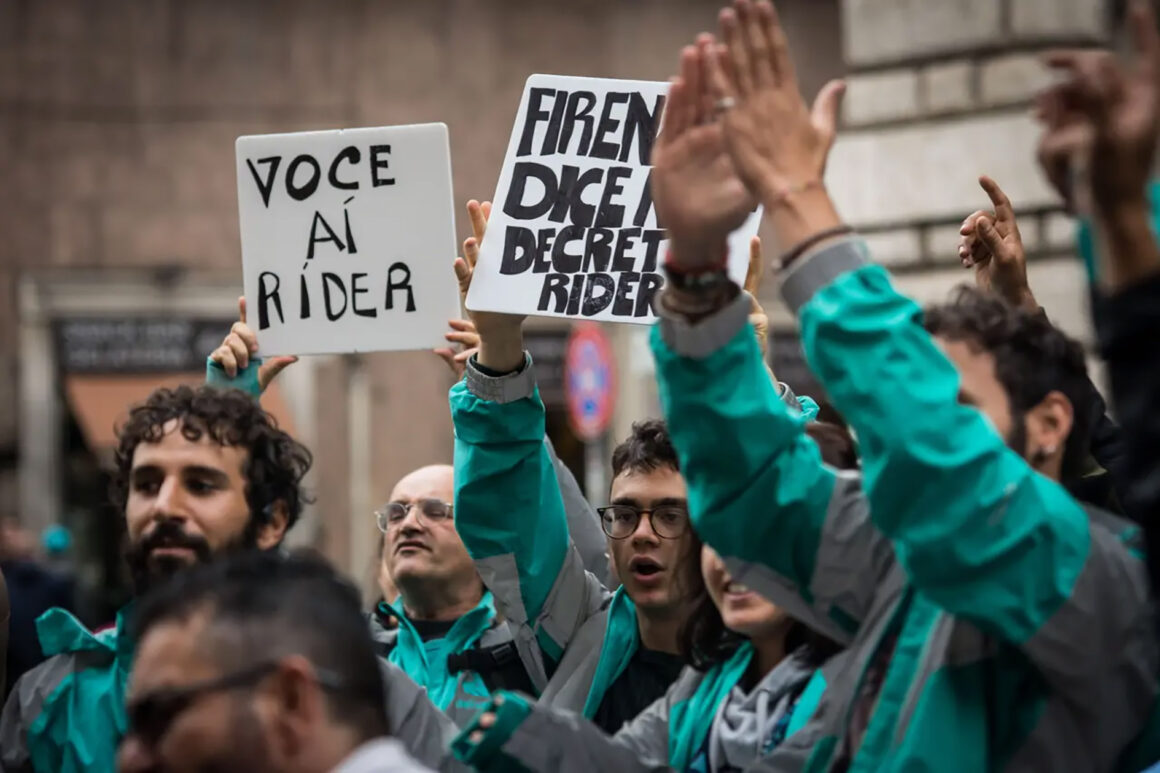By Keishia Taylor
Valentine’s Day is one of the most profitable nights of the year for food delivery apps like Deliveroo, Uber Eats, and Just Eat. This made it the perfect night for delivery workers, some of the most exploited workers in Ireland, to join the international strike against their appalling pay and conditions.
No love for gig economy
Over the past few years, the minimum rate per delivery has been slashed from over €4 to as little as €1, depending on the impenetrable dynamic pricing algorithm. Riders report having to work an extra three or four hours per shift to maintain their pay, which, with rising housing, fuel and food prices, does not stretch as far as before. The only way to make more money is to work longer and ride faster, taking more risks in busy traffic. Many work 10 hours per day almost every day just to survive.
In a boon for the “gig economy,” food delivery workers are legally considered contractors rather than employees and are therefore not protected by employment law or entitled to minimum wage, holiday pay or the right to unionise. These workers must supply their own bike or vehicle, safety equipment, insurance and fuel, and many are forced to take loans to cover these expenses while the apps evade any responsibility.
Representatives of the apps have been quoted all over the media claiming that their drivers enjoy the flexibility, are satisfied with their work, and benefit from various “perks”. But this is a farce. In the words of one rider, “There’s no flexibility at all: you have to work the peak hours, or you don’t make anywhere near enough money.”
Racist abuse and harassment
The vast majority of riders in Ireland are migrants, particularly from Brazil or other South American countries, who turn to delivery work as one of the only available options, with many renting app accounts under the table, making them even more vulnerable. Many intend to do deliveries temporarily but need help to change jobs due to institutional barriers.
Migrant riders also face racist abuse on the streets regularly, including verbal threats, physical assaults, intimidation from car drivers, and bike theft. The Gardaí have done little to help riders when they report incidents like assault or bike theft, and only last year, four Dublin Gardaí were suspended for extorting cash from migrant delivery workers.
These workers deserve dignity every day – “all we are asking for is to be seen as humans and not machines.”
Organising struggle
The lack of legal protections as both a worker and a migrant makes it extremely difficult for these workers to challenge their paltry wages and dangerous conditions. Last year, a Supreme Court verdict against delivery workers in the UK sparked semi-spontaneous strikes of thousands of delivery workers, inspiring those in Ireland to take action.
These strikes were organised via social media, word of mouth, and particularly in Brazilian Whatsapp groups with hundreds of members. This grassroots explosion of activity by some of the most exploited and oppressed workers is brilliant and hugely inspiring, but the multinational delivery apps and the state institutions backing them up are far more organised.
It will be crucial to build the biggest and most organised campaign possible that develops a combative strategy to flex the power of the workers who do all the work. Such an organisation of workers could fight for legal union recognition as one of their demands, as well as build solidarity with food delivery workers worldwide and with communities and other workers here in Ireland to fight against racism, inequality and the exploitation of migrants and of all workers. The trade union movement must step up to the plate and help these workers get organised – an injury to one is the concern of all.












